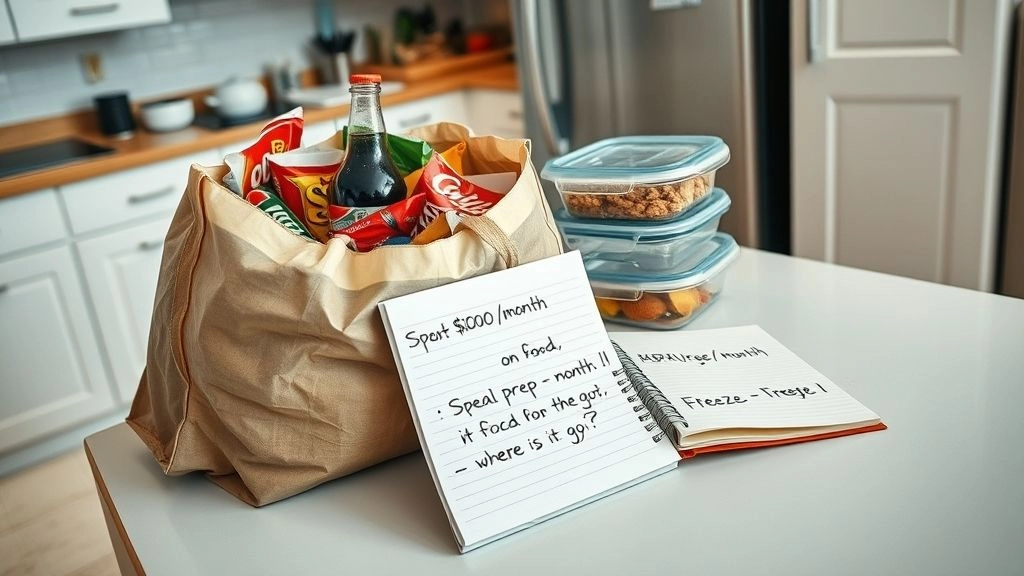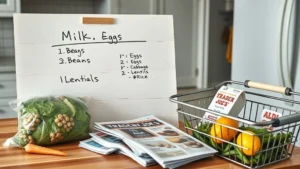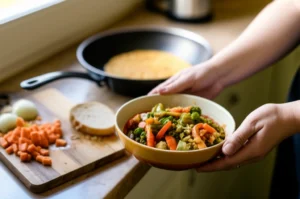Ever glance at your bank app and feel your stomach drop when you see how much just food is costing you? You’re not alone. Spending too much on food sneaks up on a lot of us—it’s one of those expenses that’s both necessary and easy to lose control over. I know the feeling… juggling busy days, grabbing snacks or takeout more often than intended, and then wondering, where the heck did all my money go?
Let’s be real: managing money well can feel like one part strategy, two parts emotional juggling act. We all want tasty, satisfying meals without the guilt of overspending or the stress of a ballooning budget. If you’re ready to bring some calm—and cash—back into your kitchen routine, keep reading. This is your friendly chat about spending less without feeling deprived.
Where Food Goes
Ever Wonder Why Food Costs So Much?
Imagine this: A young guy on Reddit realized he was spending about $600–700 every month just on food—even though he mostly cooked at home and only ate out four times a week. He was baffled. The little habits—like grabbing $10–18 meals out or those sneaky trips for snacks—added up fast. Sound familiar? Sometimes it’s not even obvious where the money disappears.
Take a moment and think about your month—how many meals are homemade? How many are restaurant runs or takeout? And what about snacks, the things you pick up “just because”? These add up big time.
The Emotional Side of Overspending
Ever catch yourself thinking, “I hate spending money on food” but still end up ordering the pizza because you’re exhausted? Hey, no judgment here. It’s tiring to cook after a long day, and sometimes the easiest option wins. The problem is that mix of fatigue, convenience, and not tracking those small costs can send us spiraling over budget without even noticing.
Here’s a little secret: the first step is awareness. When you know exactly where your money’s going, you can start making choices that feel better—not just financially but emotionally too.
Eating Out Pitfalls
How Often Do You Eat Out?
That Reddit guy’s biggest spend? Eating out four times a week. At roughly $20 a meal, that’s nearly $300 gone monthly. If you’re juggling crazy work hours (trust me, I’ve been there), it’s super tempting to pick up food instead of cooking.
Consider doing what one BBC writer tried: stop takeaways and restaurant meals for a whole month. It sounds brutal, but the savings? Massive. Plus, you might find new ways to enjoy cooking without the pressure. Win-win.
Cost Comparison: Home vs. Eating Out
| Meal Type | Eating Out Cost | Home Cooked Cost | Typical Savings |
|---|---|---|---|
| Burger & Fries | $15 | $5 | $10 |
| Noodle Bowl | $12 | $4 | $8 |
Want to be real on your spending? One meal out could buy you a set of reusable containers to help with meal prepping. Seriously, that’s an investment that pays off.
Make Meal Prep Work for You
If time is tight, batch cooking can be a lifesaver. On a Sunday, cook double batches of dinners and store portions in the fridge or freezer. Grab some quality Tupperware (or glass containers) and voilà—you have ready-made meals for the week. It’s easier than it sounds, and trust me, it slashes impulse eating out when you run low on options.
If you need some inspiration on breaking the cycle of spending too much on spontaneous buys, swing by this handy guide on How to stop spending money on unnecessary things. It helped me stop those “just one more snack” moments that added up faster than I liked.
Mastering Grocery Shopping
Shop Your Kitchen First
Before you write a shopping list, peek inside your fridge and pantry. Do you really need that bag of rice when you’ve already got two half bags lurking? That simple scan can prevent buying duplicates and help you use up what’s already there.
One tip from a tested grocery strategy: Create an “Eat Me First” box in your fridge to highlight items that need using soon. Starting meals from that box stops waste and saves cash.
Stick to a Meal Rotation
Decision fatigue is real. Choosing what to cook every single day can be exhausting—and when we’re tired, we’ll buy whatever’s easiest and most expensive. Lock in five go-to meals you love and rotate them during the week. Keep these meals plant-focused with affordable staples like beans, lentils, rice, and veggies. It’s a little boring, yes—but it works.
And hey, it’s okay to mix it up on weekends, but during the week? Keep it simple and wallet-friendly.
Why This Works
- You buy fewer random items, reducing impulse purchases
- You recognize good prices and stock up smartly
- You waste less since you cook similar meals with repeated ingredients
Tracking Prices—But Keep It Simple
Don’t feel like you need a massive spreadsheet. Just keep a little “price book” of 10 to 12 items you buy often—think things like oats, beans, rice, and tofu. Note the best price you find at your usual stores. When an item is on sale, stock up a bit. If a deal’s a trap (smaller pack for a higher per-unit cost), skip it.
This small habit keeps you from chasing every sale and saves money with less stress. For snack lovers, you might want to check out How to stop spending money on snacks—trust me, those little munchies add up way faster than you think.
Waste Less, Save More
Don’t Let Food Spoil
Wasting food is like throwing money in the trash. Studies say about a third of food waste happens at home, often because food wasn’t stored properly or forgotten. So, what can you do to protect the quality of the foods you buy when you get home? Simple things: use airtight containers, freeze perishables, or cut produce before it goes bad and add it to soups or casseroles.
Here’s a handy resource: what can you do to protect the quality of the foods you buy when you get home? It’s full of smart ideas to keep your food fresher, longer.
Love Your Leftovers
Leftovers feel like a kitchen mess, but they’re treasure. A small amount of leftover meat or veggies? Toss them into a pasta or make a quick breakfast sandwich. One family shared how turning odds and ends into tasty dishes helped them cut grocery bills by 30%. (Spoiler: They froze and labeled everything carefully.)
Easy Waste-Cutting Tips
| Tip | Why It Works | Possible Savings |
|---|---|---|
| Choose store brands | Same quality, cheaper price | Save 20–30% |
| One big weekly shop + small top-up | Limits impulse buying | Save $50/month |
| Freeze leftovers & extras | Reduces waste, meal preps done | Save $20–40/week |
Mindset Matters
Make Food Your Ally, Not Your Enemy
Let’s talk real for a second. How many times have you thought, “I hate spending money on food,” but still end up spending more than you like? That frustration is normal. Changing it means shifting how you think about food—not as a chore or a burden, but as a way to nourish yourself and your savings.
Sometimes, it’s about spending smarter, not less. One writer shared how she decided to eat better and spend more intentionally—she even increased her food budget but felt richer, not poorer. The trick? Knowing exactly where each food dollar went and making sure it brought joy or health, not guilt.
Small Steps, Big Wins
Start by reviewing your spending like that family who cut their bill by 30% after planning and using leftovers better. Then, play with your habits—maybe one less takeout meal per week, or trying meal prep Sundays. It all adds up. And if you ever get overwhelmed, remember this: every little change helps, and you’re allowed to flex and find what works for you.
Oh—and if you’re feeling stuck in a snack spiral, maybe check out I hate spending money on food for some honest, real talk that might just give you the push you need.
Wrapping It Up
Okay, so spending too much on food doesn’t have to be your story. You’ve got some solid tools now: aware where those dollars really go, cutting back on eating out, mastering simple meal prep, shopping smarter, wasting less, and shaking up your mindset. It’s not about perfect—it’s about progress.
Imagine your next grocery trip or dinner decision with confidence instead of stress. Picture saving hundreds a month that you never thought you could. That’s possible. It’s just a few steps away.
So why not start today? Pick one small tip—maybe shop your kitchen first or try a simple five-meal rotation. See how it feels. You might just find saving money on food isn’t a punishment but a delicious win.
Curious? Want some inspiration? Take a peek at How to stop spending money on unnecessary things. It’s a practical nudge that helped me, and it might help you too.
Here’s to less stress, more savings, and tasty meals that don’t break the bank.













